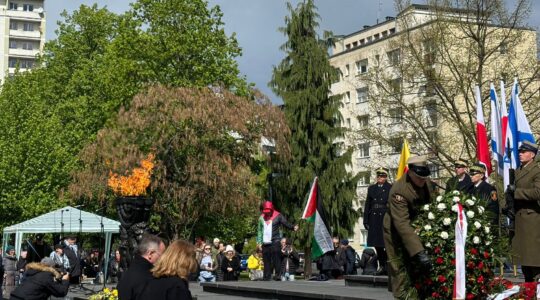BUENOS AIRES, Argentina (JTA) – Eighteen years after a deadly terrorist attack at the Israeli Embassy here killed 29 and injured more than 200, the wounds are still fresh.
On the anniversary of the bombing last week, survivors, victims’ relatives and Israeli and Argentinean government officials gathered at the scene of the bombing for a commemoration of the March 17, 1992 attack.
The perpetrators were never caught. However, Iranian-backed Hezbollah operatives were linked to the attack, and Hezbollah mastermind Imad Mugniyeh, who was killed in an unclaimed car bombing in Damascus in 2008, was said to have planned the embassy bombing. Israel was seen as being behind Mughniyeh’s assassination two years ago.
Despite the unanswered calls for justice in Argentina, the talk at last week’s ceremony wasn’t just about the past. It was also about the growing ties between Iran and Latin America.
Argentina’s president, Cristina Fernandez de Kirchner, reiterated at last year’s U.N. General Assembly a request for the extradition of several Iranian officials sought in connection with another attack on an Israeli target in Argentina – the 1994 bombing of the AMIA Jewish community center in Buenos Aires, which killed 85 people – but some members of her own political party continue to cultivate close ties with Iran.
Argentina’s justice minister, Julio Alak, spoke with reporters at some length about the need for justice in the bombing. But when asked by JTA about the government’s stance on the increasingly close ties between Iran and certain Argentinean officials, such as unionist Luis Delia, a former official in Nestor Kirchner’s government, Alak shrugged. Earlier this month, Delia met in Teheran with where he met Moshen Rabbani, who stands accused of involvement in the 1992 bombing.
Alexander Ben Zvi, the director of the South America desk of the Israeli Foreign Ministry, said that, given Iran’s increasingly close ties with the anti-American, anti-Israeli Hugo Chavez regime in Venezuela, another Iranian-sponsored attack on South American soil remains a possibility.
“Latin America will be the target of another Iranian-sponsored terrorist attack,” Mark Dubowitz, the executive director of the Washington-based Foundation for Defense of Democracies, told JTA in an interview. “Iran has deeply penetrated Venezuela, and with active support from the Chavez government, it now has a regional base from which to recruit local operatives, fundraise, procure weapons, conduct pre-attack surveillance and hide its intelligence agents using Venezuelan political and diplomatic cover.”
Venezuela remains an important ally for Argentina. When Argentina hit an economic crisis in 2001, Venezuela was one of the few countries that provided Argentina with funds.
Israel’s minister of public security, Yitzhak Aharonovitch, who traveled to Buenos Aires with Ben Zvi for last week’s ceremony, used his speech at the event to denounce Al Qaeda and Iran’s infiltration of Latin America.
Argentinean Foreign Minister Jorge Taiana also criticized the “intransigent attitude” of the Iranian government regarding Argentina’s investigation of the 1992 attack and its request for the extradition of Iranian suspects.
For Carlos Sussevich, who lost his daughter in the 1992 attack, the issue is personal.
“It’s been 18 years since my daughter Liliana was killed,” Sussevich said in an interview before the commemoration ceremony began March 17. “In the Jewish tradition, the number 18 symbolizes life,” he said. “I hope we can catch the murderers, so that life will win over death.”
While Argentinean investigators have fingered Iran as being behind the attack, no arrests were ever made of the locals who aided or perpetrated the attack. Victims’ families and their supporters have complained that Argentinean prosecutors are only focused on the international connection.





